| Srl | Item |
| 1 |
ID:
133755
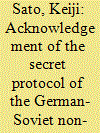

|
|
|
|
|
| Publication |
2014.
|
| Summary/Abstract |
In June 1989, the First Congress of People's Deputies of the Soviet Union established the Commission for Historical and Legal Estimation of the Soviet-German Non-aggression Pact of 1939. In the commission, representatives from Estonia, Latvia and Lithuania condemned the Soviet annexation of the Baltic States, prompting heated arguments regarding the invalidity of the related secret protocol of the pact with other members who continued to hold the traditional Soviet ideological view of the pact as something positive. The debate over the secret protocol had the further potential to extend to disputes over 'recovery of lost territory' amongst the Baltic States, Ukraine, Moldova, Belarus and Russia. This article analyses the arguments used by commission members, considering the interplay of national interests, how they balanced arguments between restoration of 'state sovereignty' and maintenance of borders, and how they finally compromised and concluded the commission's report.
|
|
|
|
|
|
|
|
|
|
|
|
|
|
|
|
| 2 |
ID:
134072
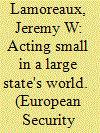

|
|
|
|
|
| Publication |
2014.
|
| Summary/Abstract |
The interest in small states ebbs and flows as important international affairs include small states. Russia's actions and policies vis-à-vis Ukraine, and the resultant intensified apprehension among Russia's smaller neighbours, aim the proverbial microscope at the size and power discrepancies between states. Russia, by most metrics, is a large state and the Baltic states, by those same metrics, are small states. Small-state scholars expect large and small states to act differently. However, the case of Russia and the Baltic states indicates that large and small states do not, in fact, act all that different. This being the case, this article calls into question many of the assumptions made by small-state scholars about the difference between large- and small-state action and argues for changes within small-state studies as a subdiscipline of the larger international relations discipline.
|
|
|
|
|
|
|
|
|
|
|
|
|
|
|
|
| 3 |
ID:
076726
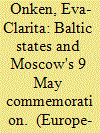

|
|
|
|
|
| Publication |
2007.
|
| Summary/Abstract |
This article develops a three-level framework for analysing the role of memory in contemporary European politics. It tests the utility of this framework based on the three Baltic states and their public and political debates around the World War II anniversary commemorations in Moscow in 2005. Existing concepts for analysing the impact of memory on policy decisions are discussed first on the levels of domestic politics and bilateral relations. The article then provides a framework for researching a lesser acknowledged third level of memory politics within European institutions. The dilemma felt by the three Baltic presidents over whether or not to attend the Moscow ceremonies provides a unique opportunity to look at all three levels and demonstrate their relevance for understanding future memory struggles in an enlarged Europe.
|
|
|
|
|
|
|
|
|
|
|
|
|
|
|
|
| 4 |
ID:
059085
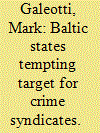

|
|
|
| 5 |
ID:
021020
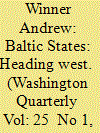

|
|
|
|
|
| Publication |
Winter 2002.
|
| Description |
207-220
|
|
|
|
|
|
|
|
|
|
|
|
|
|
|
|
| 6 |
ID:
013149
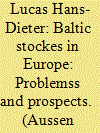

|
|
|
|
|
| Publication |
1997.
|
| Description |
127-36
|
|
|
|
|
|
|
|
|
|
|
|
|
|
|
|
| 7 |
ID:
083275
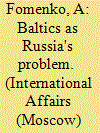

|
|
|
|
|
| Publication |
2008.
|
| Summary/Abstract |
THE DIPLOMATIC AND POLITICAL SCANDAL that burst out between Russia and Estonia early in 2006 over the future of the military burials of World War II (the Great Patriotic War) times supplied another confirmation of our persisting internal inability to enter into a dialogue if it is needed to counter the opponent's demagoguery with well-substantiated historical arguments to confirm Russia's status as the legal heir of the Soviet Union and the Russian Empire. ... We should not waste time by reminding the Estonian and Latvian anti-communists that we "saved them from Nazism" - this would amount to talking Italian to a German or Serbian to a Frenchman
|
|
|
|
|
|
|
|
|
|
|
|
|
|
|
|
| 8 |
ID:
171702
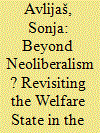

|
|
|
|
|
| Summary/Abstract |
Scholars of political economy have criticised the Baltic states’ transition to capitalism as socially ‘disembedded’ and shaped by a zealous form of neoliberalism. This article argues that the Baltic welfare states have experienced a more complex post-socialist transformation than suggested by the ‘neoliberal retrenchment’ narrative, which relies on the traditional definition of the welfare state and focuses solely on cash compensation for the ‘losers’ of transition. By uncovering higher investment in education, more generous labour market policies and a larger expansion of public sector employment than in the Visegrád countries, the article uncovers social investment oriented welfare states in the Baltic.
|
|
|
|
|
|
|
|
|
|
|
|
|
|
|
|
| 9 |
ID:
173234
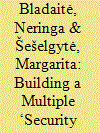

|
|
|
|
|
| Summary/Abstract |
The essay addresses the nexus between security challenges and response strategies in the Baltic region. The analysis is based on the framework provided by a shelter theory, which distinguishes three levels of security strategies oriented towards external players: political (military), economic and societal. The essay finds out that, first, military and economic challenges to the Baltic states are mostly managed through ‘external shelter’ (NATO (United States) and the European Union); second, most of the current security challenges manifest in the societal sector, predominantly as a result of Russia’s hybrid offensive activities in the region. To deal with these societal challenges, the Baltic states are employing combined strategies of ‘shelter’ and ‘building a buffer from within’, but with a clear priority on internal efforts.
|
|
|
|
|
|
|
|
|
|
|
|
|
|
|
|
| 10 |
ID:
046261
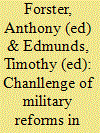

|
|
|
|
|
| Publication |
New York, Palgrave Macmillan, 2002.
|
| Description |
x, 260p.
|
| Standard Number |
0333946219
|
|
|
|
|
|
|
|
|
|
|
|
Copies: C:1/I:0,R:0,Q:0
Circulation
| Accession# | Call# | Current Location | Status | Policy | Location |
| 046294 | 355.30947/FOR 046294 | Main | On Shelf | General | |
|
|
|
|
| 11 |
ID:
186065
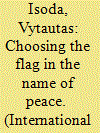

|
|
|
|
|
| Summary/Abstract |
The twenty-first century peacekeeping landscape is defined by the multiplicity of institutional frameworks under which international operations are deployed. Small states with limited resources cannot meet every demand for troop contributions and face the inevitable dilemma of choosing whose ‘flag’ to carry. For the first decade after joining NATO and the EU, the Baltic States gave a clear priority to NATO and U.S.-led military operations, but since the 2014 Ukrainian crisis gradually shifted their focus to the UN framework. Drawing on interviews with policy-makers in the three Baltic countries this article aims to explain this recent shift. It reviews the main theoretical assumptions about troop contributions to the UN peacekeeping operations and burden-sharing behaviour among NATO allies, and suggests that the recent troop deployment decisions of the Baltic States are best explained by a realist focus on national security concerns. The seemingly ‘internationalist’ context of UN peacekeeping operations simply happened to be most suitable for a bilateral exchange with their European allies, namely Germany and France, that in turn contributed troops to NATO's Baltic flank.
|
|
|
|
|
|
|
|
|
|
|
|
|
|
|
|
| 12 |
ID:
170144
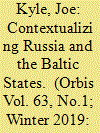

|
|
|
| 13 |
ID:
008396
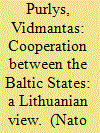

|
|
|
|
|
| Publication |
May 1995.
|
| Description |
27-31
|
|
|
|
|
|
|
|
|
|
|
|
|
|
|
|
| 14 |
ID:
130893
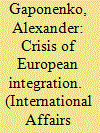

|
|
|
|
|
| Publication |
2014.
|
| Summary/Abstract |
AFTER THE USSR'S COLLAPSE, the Baltic states came under the political influence of the US and the economic influence of the European Union. This influence was used by their new geopolitical "curators" to initiate an anti-Russian line in both the foreign and domestic policies of Latvia, Lithuania and Estonia, as well as to break their economic ties with Russia. At present, the only significant economic ties that Russia still has with the Baltic countries are in the energy sector. It's the supply of natural gas through the pipeline and distribution systems with the use of the Incukalns underground storage facility. It's also the supply of Russian electricity and rail deliveries of hydrocarbons via the Ventspils and Klaipeda ports.
|
|
|
|
|
|
|
|
|
|
|
|
|
|
|
|
| 15 |
ID:
019398
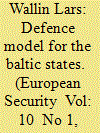

|
|
|
|
|
| Publication |
Spring 2001.
|
| Description |
94-106
|
|
|
|
|
|
|
|
|
|
|
|
|
|
|
|
| 16 |
ID:
130903
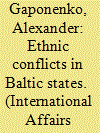

|
|
|
|
|
| Publication |
2014.
|
| Summary/Abstract |
To my mind, the European Union - EU was planned as strictly an economic union and its founder did not plan right from the start to form a single European community of nations or even a European civilization of a higher level.
|
|
|
|
|
|
|
|
|
|
|
|
|
|
|
|
| 17 |
ID:
080524
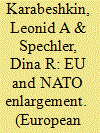

|
|
|
|
|
| Publication |
2007.
|
| Summary/Abstract |
For Russian policymakers no events in the post-Cold War period have had more momentous consequences or received greater public commentary, both before and after they occurred, than the almost simultaneous enlargement of NATO and the EU that took place in 2004. The most sensitive aspect of this 'dual enlargement' for the Russian Federation was the extension of these two organisations into the Baltic States, which had been part of the Soviet Union itself. Despite some uneasiness, Moscow anticipated that the extension of the EU into the former Soviet sphere, even into the former Soviet Union itself, would constitute a generally positive development, while NATO penetration of that sphere would be extremely harmful. Accordingly, Russia voiced little opposition to the EU's plans and made only limited efforts to insure that its major interests would be protected, while it actively sought to forestall the NATO project, especially with regard to the Baltics. As it turned out, however, most of Russia's expectations regarding the impact of these processes were mistaken, and Russia's interests were poorly served by its prior and subsequent responses
|
|
|
|
|
|
|
|
|
|
|
|
|
|
|
|
| 18 |
ID:
075394
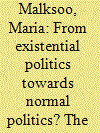

|
|
|
|
|
| Publication |
2006.
|
| Summary/Abstract |
This article presents a critical discourse analysis of the Baltic states' self-positioning within European foreign policy. It argues that, despite certain relief in their immediate security concerns after the dual enlargement of the EU and NATO, the shift from existential politics to normal politics by the Baltic states is far from being accomplished. The way in which the countries of Central and Eastern Europe (CEE) have responded to the construction of their identity as 'Europe but not Europe' throughout the enlargement processes of the EU and NATO has been largely neglected in empirical studies on their post-Cold War self-conceptualizations in the European arena. Yet, the experience of being framed as simultaneously in Europe and not quite European has left a constitutive imprint on the current security imaginary of the Baltic states. William Connolly's concept of the politics of becoming is thus applied to analyse the Baltic version of becoming a subject in the field of common European foreign policy.
|
|
|
|
|
|
|
|
|
|
|
|
|
|
|
|
| 19 |
ID:
162231
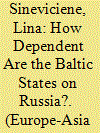

|
|
|
|
|
| Summary/Abstract |
This article explores the impact of international trade on private investment in the three post-Soviet Baltic states—Estonia, Latvia and Lithuania—by applying the business cycle synchronisation theory and highlighting the importance of big neighbours for small open economies. The study covers 1995–2015. The study shows that changes in the GDP growth of trading partners can have a greater effect on domestic private investment in small open economies than GDP changes in their own economies. The ongoing business cycle synchronisation between Russia and the Baltic countries means that the impact of Russia as a big neighbour remains an important issue for the latter.
|
|
|
|
|
|
|
|
|
|
|
|
|
|
|
|
| 20 |
ID:
081255
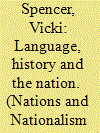

|
|
|
|
|
| Publication |
2008.
|
| Summary/Abstract |
In contrast to the abstract commitment to individual rights found in liberal critics of Bill 101 and the equally ahistorical approach of multicultural theorists like Bhikhu Parekh, this paper proposes that the particular historical circumstances surrounding the current minority status of different groups is crucial in evaluating the legitimacy of one cultural group to promote its cultural needs over another group within existing states. When the culture of a group residing within a particular state is secure in a neighbouring jurisdiction, the issue at stake is not necessarily the survival of a unique culture but the cultural needs of particular individuals. It does not follow that they have no legitimate claims against the state. However, in examining the language policies in Quebec and the newly independent Baltic states, it is argued that they are different in kind to the rights due to long-standing communities struggling for linguistic surviva
|
|
|
|
|
|
|
|
|
|
|
|
|
|
|
|